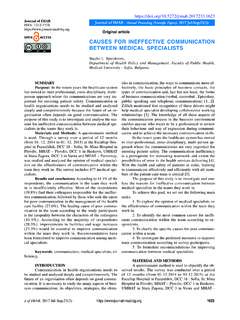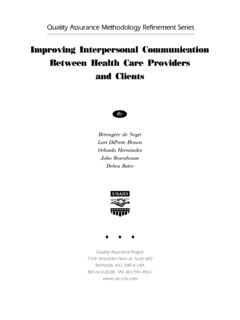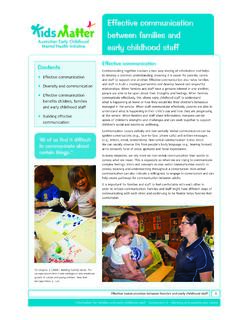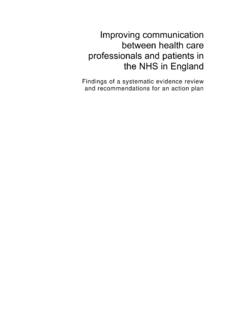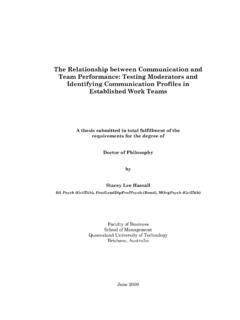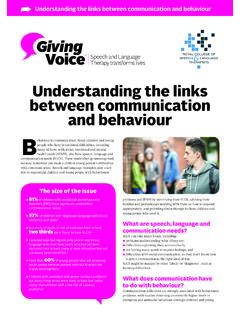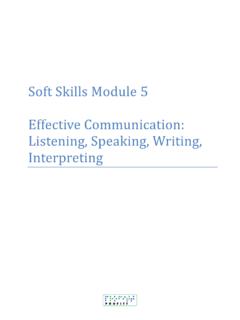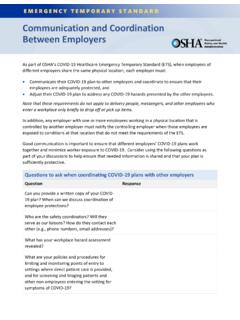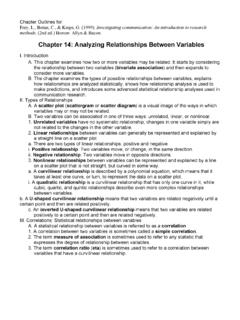Transcription of Exploring the Impact of Ineffective Formal Communication ...
1 English Language Teaching; Vol. 13, No. 3; 2020 ISSN 1916-4742 E-ISSN 1916-4750 Published by Canadian Center of Science and Education 68 Exploring the Impact of Ineffective Formal Communication between Teachers and Students: A Case Study of Mustaqbal University and Jubail University College, Kingdom of Saudi Arabia Hanan Albalawi1 & Muhammad Nadeem2 1 English Language Department, Jubail University College, Jubail, KSA 2 English Language Department, Administration and Humanities College, Mustaqbal University, Buraidah, KSA Correspondence: Hanan Albalawi, English Language Department, Jubail University College, Jubail, KSA Received: January 1, 2020 Accepted: February 16, 2020 Online Published: February 19, 2020 doi: URL: Abstract This study investigates the specific barriers to effective Communication by teachers and students of the EFL programs of higher education in the Saudi Kingdom.
2 The study utilized a qualitative design to examine perspectives of EFL students and the faculty members of the EFL programs at Al-Mustaqbal and Jubail University College on the effects, causes and viable solutions to Ineffective Communication between teachers and students. Data collection involved interactive methods which included using open-ended questionnaires and online focus groups respectively. Overall, 39% agreed that poor and Ineffective Communication is common between teachers and students, and 44% agreed that it was a cause of poor performances for students in EFL programs; while 17% indicated that Ineffective Communication between teachers and students was to blame for the poor quality of engagement of students with their teachers. The findings qualify the critical significance of considering the implementation of motivating methodologies for improving teacher-student Communication .
3 Keywords: preparatory program, EFL, Saudi students, learning factors, effective Communication , teaching English 1. Introduction Defined as the process of transmitting, receiving and decoding of ideas, Communication is a vital enabler of effective and productive human interactions and engagements. According to Saunders and Mills (1999), there are four main skills involved in Communication engagements by individuals, listening, speaking, reading and writing, and that the effectiveness of the process of Communication is heavily dependent on the extent of shared understanding of the contexts in which the Communication takes place. For Criper and Widdowson (1975), the act of sending or transmitting and receiving a message qualifies Communication as a physical operation involving an addresser as the source of a Communication message directing their message to an addressee or the target recipient of the message.
4 The implication here is that Communication is both an act as such relates to the generating of a message and a process. In particular, it is a process because it is all about ensuring the intended message is successfully transmitted to the intended recipient and interpreted as intended. On the contrary, according to Neill (2017), Communication in the context of teaching and learning differs from normal Communication in a variety of ways. In particular, unlike in normal Communication engagements, the Communication between teachers and students is grounded on the existence of a Formal relationship bond. As such, it involves upholding the norms and values of the field of teaching while communicating. In a language classroom, more than often, the teacher acts as an addresser or a speaker, whereas, a student acts as an addressee or a listener.
5 Besides, teacher Communication skills are important for a teacher in the delivery of education to students (Burns & Seidlhofer, 2010). However, as in normal Communication , Communication between teachers and students entails the decoding of the ideas by the students as transmitted by the teacher. Furthermore, Communication between teachers and students is also influenced by the guide-learner relationship. Research Problem In practice, however, although the formality of the Communication between teachers and students is meant for enhancing the success prospects of the teaching-learning process, there are numerous incidents in which the English Language Teaching Vol. 13, No. 3; 2020 69 process fails to achieve desired results (Khan, 2011). Effective Communication between teachers and students is meant for creating a positive classroom environment, an element that is usually inhibited by the failure of teachers to engage their students.
6 The result of such is a situation in which students are forced to unduly struggle to maintain focus on the subject matter (Khan, et al., 2018a). Numerous studies have indicated on the critical role that modern technology has as a critical determinant of the nature of Communication in the modern classroom (Khan et al., 2019; Khan, et al., 2018a; Khan, et al., 2018b; Shahbaz, et al., 2016; Shahbaz & Khan, 2017). To this end, there are a variety of issues to blame for Ineffective Communication between teachers and students. Of particular significance, with most of the English teachers in these programs being non-natives, the teaching process generally involves the direct method of teaching. Unfortunately, the outcome of such programs continues to be characterized by low achievement or unsatisfactory and far below the expectations in EFL among students despite numerous policy attempts by the Saudi government to improve on the teaching and learning of English in the country (Shahbaz & Khan, 2017; Khan et al.)
7 , 2019; Khan, et al., 2018a). According to Shahbaz and Khan (2017), the problem can be blamed on a variety of factors such as unknown expectations, problems with comprehension, boring classroom lessons, personality differences, cultural difference, negative attitude from both parties, peer pressure and the lack of effective training of teachers to ensure their context-specific proficiency. Notably, these factors lead to compromising the effectiveness of Formal Communication between teachers and students. According to Fageeh (2013), failure by EFL institutes in Saudi Arabia to achieve desired goals has caused serious concerns among different stakeholders to the education systems in the Kingdom. Though there is evidence of numerous questions surrounding this failure, teachers are in record for complaining of the inability of students to comprehend the lessons (Fageeh, 2013).
8 As noted by Alhmadi (2014), despite the attempts of the Saudi government to effectively plan a comprehensive curriculum and to provide textbooks, the teaching-learning process seems futile because actual skills development is lacking ( ). Mustaqbal University and Jubail University college in Saudi Arabia offer post-secondary education EFL programs to students interested in furthering their education in English. However, like other EFL students and teachers in Saudi Arabia, these programs suffer an inherent challenge in achieving effective Communication between students and teachers. The process of Communication does not meet the required standards, an element which translates to the unsatisfactory performance of the students and the programs as a whole. Consequently, the purpose of this research study is to investigate the specific barriers to effective Communication by teachers and students of the EFL programs in these two major institutions of higher learning in the Saudi Kingdom.
9 In particular, based on the findings from this study, the researcher seeks to determine and recommend feasible evidence-based solutions to the barriers to effective Formal Communication between students and faculty members. Research Questions To achieve its aims and objectives, this study specifically delves to answers the following three major research questions: 1. What forms of Communication strategies are currently in common use between the faculty and EFL students in the EFL programs at the Mustaqbal University and Jubail University college? 2. What are the effects of current Formal Communication approaches on the acquisition of linguistic skills by EFL students? 3. What are the main causes of Ineffective Formal Communication between teachers and students and how to overcome such barriers? Significance of the Study The rationale behind this study is well-informed by the fact that failure by EFL institutes in Saudi Arabia to achieve desired goals has caused serious concerns among various stakeholders to the education systems in the Kingdom (Fageeh, 2013).
10 As a viable solution to these concerns, the findings of this research will be of great value as a reliable source of empirical evidence and insights to revealing the actual causes and risk factors to Ineffective Formal Communication as the main reason for persistent problem of unsatisfactory performance of EFL programs at the two institutions and in other institutes across the Kingdom. More notably, the current study also seeks to explore feasible solutions and/or strategies for addressing the issue of Ineffective Communication . As a result, the findings of this study will be a great contribution to the existing literature not just on the causes of Ineffective Communication between teachers and EFL students and associated Impact of EFL program outcomes, but more notably on evidence-based strategies for enhancing effective Communication .










